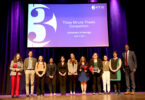Athens, Ga. – The University of Georgia College of Veterinary Medicine hosted more than 100 veterinary professionals at its second Shelter Medicine Seminar on Feb. 7. The one-day seminar focused on the best management and medicine practices for local and regional animal shelters.
Animal shelter professionals from all over Georgia attended the seminar, including representatives from Augusta Animal Services, the Gwinnett Animal Shelter, Southern Hope Humane Society, the Humane Society of Morgan County, Fulton County Animal Services, the Athens Area Humane Society, Boggs Mountain Humane Society, the Atlanta Humane Society, the Humane Society of Northeast Georgia, Fayette County Humane Society, Meriwether County Animal Shelter, Rockdale County Animal Control, Columbia County Animal Service, and DeKalb County Animal Services.
“The purpose of the UGA-CVM Shelter Medicine Seminar was to bring Georgia county animal shelters and rescue groups to the college to learn about best shelter protocols from outside authorities and CVM faculty—all whom have expertise in issues that shelters face daily,” said Ruth Usher, a third-year veterinary student who helped organize the seminar. She also helped organize the first Shelter Medicine Seminar held in 2009.
Guest speakers included Dr. Sara Pizano, director of animal services for the Miami-Dade Animal Services Department in Florida. She discussed some of the changes she has made in her two-and-a-half years at that facility. Dr. Susan Krebsbach of the Humane Society Veterinary Medical Association discussed the benefits of early-age spaying and neutering. Veterinary medicine faculty from UGA who participated included Dr. Patrick Hensel, assistant professor of dermatology, who talked about new shelter protocols for preventing and treating ringworm. Dr. Kate E. Creevy, assistant professor of small animal medicine, presented information on prevention and treatment of upper respiratory diseases in canines and felines. Dr. Andy Moorhead, assistant research scientist from the department of infectious diseases, talked about prevention and treatment of intestinal parasites. Bettina von Ammon, a third-year veterinary medicine student, conducted a session on the growing field of veterinary forensics.
Sponsors of the event included the student chapters of the Shelter Medicine Club and Animal Welfare Club; corporate sponsors included Intervet/Schering-Plough Animal Health and HSVMA.
The Animal Welfare Club brought Pizano to the college in hopes of generating interest in funding for the college’s shelter medicine program, a fourth-year spay/neuter rotation with an elective course on shelter medicine. So far, the college has received two small donations and a recent $40,000 donation, which will go toward funding instruction and operating costs of the program.
“The shelter medicine program will have a positive impact on veterinary students, our community and animals by increasing student awareness of issues in sheltering animals, pet overpopulation, animal welfare, and the roles veterinarians can play in addressing these issues,” said Dr. Nicole Northrup, an oncologist who is also the faculty adviser to the Shelter Medicine Club. “The ultimate goal is for all students, whether they are interested in careers in shelter medicine or not, to gain an appreciation for the issues and, as veterinarians, to be supportive of shelters and the homeless animals for which they care.”
The UGA College of Veterinary Medicine, founded in 1946, is dedicated to training future veterinarians, to conducting research related to animal diseases, and to providing veterinary services for animals and their owners. Research efforts are aimed at enhancing the quality of life for animals and people, improving the productivity of poultry and livestock, and preserving a healthy interface between wildlife and people in the environment they share. The college enrolls 102 students each fall out of more than 550 who apply. For more information, see www.vet.uga.edu.
The current UGA College of Veterinary Medicine Teaching Hospital, built in 1979, serves more than 18,000 patients per year in one of the smallest teaching hospitals in the United States. The college is currently working to raise $15 million toward building a new Veterinary Medical Learning Center, which will include a new teaching hospital as well as classrooms and laboratories that will allow for the education of more veterinarians. The goal is to increase enrollment to 150 when the Veterinary Medical Learning Center is built. http://www.vet.uga.edu/giving/campaign.php.







